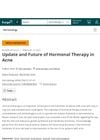TLDR Adult acne is more common in women, often linked to hormones, and can be harder to treat.
The document from 2014 details that adult acne, which can either persist from adolescence or emerge after age 25, is more common in women and may be influenced by a genetic predisposition. Hormonal factors, particularly in women with conditions like PCOS and CAH, play a significant role in its pathogenesis, with premenstrual flares being typical. Adult acne often presents as deep inflammatory papules on the lower third of the face and is more resistant to treatment. The prevalence in women is reported between 12 to 51%, and in men between 3 to 42%. Diagnosis involves a comprehensive medical and family history, physical examination, and laboratory tests to identify hyperandrogenemia and metabolic syndrome. Treatment options include hormonal therapy and isotretinoin, but not all patients with hormone-related acne will show abnormal blood tests, possibly due to increased skin sensitivity to androgens.
 118 citations
,
September 2004 in “Clinics in Dermatology”
118 citations
,
September 2004 in “Clinics in Dermatology” Hormones, especially androgens, play a big role in acne, but most acne sufferers don't have a hormone disorder. Hormonal treatments, including birth control pills, can be very effective for women whose acne doesn't improve with regular treatments.
 78 citations
,
January 2003 in “Dermatology”
78 citations
,
January 2003 in “Dermatology” Hormonal therapy is becoming a promising treatment for acne.
 76 citations
,
November 2009 in “Medical Clinics of North America”
76 citations
,
November 2009 in “Medical Clinics of North America” Hormones, especially androgens, play a key role in acne, which can be a symptom of systemic diseases like PCOS and may require targeted treatment.
 4 citations
,
April 2016 in “Journal of Dermatology Research and Therapy”
4 citations
,
April 2016 in “Journal of Dermatology Research and Therapy” Anti-androgens are safe and effective for treating moderate to severe adult female acne.
 96 citations
,
September 2008 in “Seminars in Cutaneous Medicine and Surgery”
96 citations
,
September 2008 in “Seminars in Cutaneous Medicine and Surgery” Hormonal treatments, including birth control and antiandrogens, can effectively treat acne in women.
 21 citations
,
July 2014 in “Clinics in Dermatology”
21 citations
,
July 2014 in “Clinics in Dermatology” Hormonal contraceptives can help treat acne by affecting sebum production and androgen levels.
 24 citations
,
January 2013 in “Indian Journal of Dermatology, Venereology and Leprology”
24 citations
,
January 2013 in “Indian Journal of Dermatology, Venereology and Leprology” Hormonal treatment is effective for women with acne not helped by usual treatments, especially if they have hormonal imbalances.







